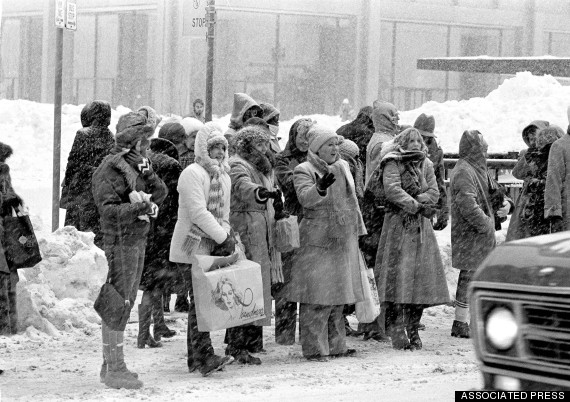
Are we becoming a bunch of babies for canceling schools due to extremely cold weather? ("Back in my day, we walked to school in blizzards -- uphill both ways!") Or is there something wrong with the way people remember the winters of yesteryear?
It was so cold in Chicago this week that the city's public school system -- the third-largest in the nation -- had to cancel classes. A similar scenario played out in January 2014 when the polar vortex (a mass of arctic air that moves much farther south than usual) brought sub-zero temperatures to the area. The Chicago Tribune has published an op-ed labeling such school closings as the “continued wussification of society” and calling today's children “wimpy.”
“And just what are we talking about? Expected lows of -- hold on tight -- minus 8. Come on, Mike Ditka would play football sleeveless in minus 8. Our kids can go to school,” wrote William Choslovsky in the Tribune. He went on to add: "Once upon a time, we looked for excuses to work hard and persevere. Today, however, it seems as if we search for opportunities to call it a day and shut down shop.”
And it's not just Chicago: Numerous school districts throughout the Midwest and eastern U.S. also closed schools this week because of the cold.
So is Choslovsky right? Are schools today more likely to close than they were back in the good old days, and does that mean we've been wussified? The answers are complicated, and psychology plays an important role in our perception of the matter.
Scott Sabol, meteorologist at Cleveland-based FOX affiliate WJW, told The Huffington Post that two factors lead people to believe there's a long-term trend of schools closing more often due to extreme weather: "serial position effect" and "confirmation bias."
The serial position effect causes individuals to more easily recall items at the beginning and end of a list than those in the middle. As a result, Sabol says, many adults today recall the extremely harsh Midwest winters of the late 1970s and early 1980s in a “mythical” way that's “chiseled in granite” and serves as a reference point for arctic weather today.
“No winter, regardless how extreme, could top those of that time,” Sabol explained.
Conversely, individuals are less likely to recall the relatively mild winters of the late 1980s and early 1990s when extreme weather was less common and, as a result, school closings were also less common, Sabol believes.
(Story continues below.)
Homebound Chicago office workers beg for rides from what passing motorists there are on Michigan Avenue, Jan. 15, 1979. The storm paralyzed the city and stands as one of the worst blizzards in its history. (AP Photo/Charles Knoblock)
Confirmation bias -- the tendency to more easily recall memories that confirm one’s own beliefs -- might explain why some adults view the current generation as less hardworking or tough than previous generations. It might also be the reason why some believe white Christmases were more common in the past, when in reality it appears that snow-covered Christmases in many parts of the U.S. were less frequent from 1966 - 1989 than they were from 1990 - 2013.
Sabol argues that the milder winters of further-back decades are easier to forget because they don't jibe with the perception that times were tougher back then.
“It’s all about our historical perceptions and our false notion that the past is always more harsh and extreme than the present,” Sabol told HuffPost. “Our biases prevent us from seeing the big picture."
As Chicago magazine’s Whet Moser points out, 1977 was the first year Chicago schools began to close due to cold weather -- as opposed to snow alone -- with some consistency. Prior to the 1970s, existing records suggest that when there was a brutal cold snap, children were forced to go to school, so long as there wasn't extreme snowfall along with the cold.
Thus, school closings due to extreme weather seem more likely today than they did prior to the 1970s, but it’s difficult to pin the blame on “wussification."
Forecasting technology has improved drastically in recent decades, and school districts are also more able to accurately anticipate when weather conditions could be dangerous for students. More recently, relatively sophisticated weather apps and social media have proliferated, allowing the public to more easily apply pressure on the matter of school closings.
“We’re all more aware of the weather, psychologically,” ABC News chief meteorologist Ginger Zee previously told HuffPost.
"We all have a phone. Every hailstorm that falls, every tornado that hits, we can take a video and share it," Zee explained.

